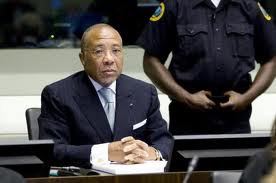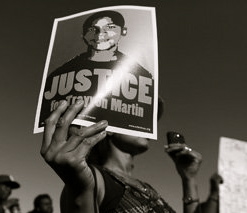
Responding to readers’ comments to our same-sex marriage post
We had a few comments from readers regarding my recent post on the Church of England’s views on same-sex marriage, co-written with my colleague Iain McLean. Below are two reader responses, and my replies. David wrote: ‘that differential treatment of the applicants’ rights fell within the ‘margin of appreciation’ afforded to member states.’ This is crucial factor in assessing the Church of England’s response. The reason for the European Court respecting the margin of appreciation. Judge Malinverni put it clearly: ‘Article 12 is inapplicable to persons of the same sex. Admittedly, in guaranteeing the right to marry, Article 9 of the Charter of Fundamental Rights of the European Union deliberately omitted any reference to men and women, since it …
ICC Captive Is Pawn in Struggle between Militias and the NTC
The key fault lines dividing the interim Libyan central government from both the militias and the international community are starkly illustrated in the ongoing saga surrounding the detention of four International Criminal Court (ICC) officials in Libya since June 7th. Among the detainees, Melinda Taylor has received the brunt of media attention, because she is a young and attractive Australian lawyer who was assigned by the ICC to represent the deposed dictator’s son, Saif al-Islam al-Qadhafi. She is currently being held captive by Zintani militiamen for ‘spying’. She allegedly possessed a digital pen camera and passed her client encrypted messages from Mohammad Ismael — a former crony of Saif’s, wanted for war crimes. It will likely be impossible for the …
History written and rewritten
John Sentamu, the Archbishop of York, recently posted a long statement explaining his opposition to same-sex marriage. Some of it appeared in the Guardian and on the Guardian’s CIF Belief blog. In it he referenced an interview he recently gave to the Daily Telegraph, which contains the following statement: We supported Civil Partnerships (the bishops in the House of Lords), because we believe that friendships are good for everybody. Like other religious opponents of same-sex marriage, he goes on to argue that civil partnership is “in every respect in ethical terms an honourable contract of a committed relationship”. Same-sex couples, he therefore says, should not press for marriage. But his factual claim is false. The main Lords debate on the …

Coordination in the Fight Against Transnational Organised Crime in the Americas: another band-aid solution?
In light of last month’s VI Summit of the Americas in Cartagena, Colombia, it seems obvious and commendable that the Secretary General of the Organization of American States (OAS), José Miguel Insulza, would call on the leaders of the region Friday to help coordinate the fight against transnational organised crime. The threat is, he claimed, the “main challenge to security in our hemisphere.” Insulza’s call comes on the heels of the adoption in Cartagena of Mexico’s proposal to create an Inter-American Centre for Coordination against Transnational Organised Crime. It is clear that dealers in drugs, arms and human trafficking (these items increasingly the wares of the same criminal merchants) do not limit their activities to the confines of national borders. And …

Charles Taylor trial highlights ICC concerns
After a long and expensive trial, the Special Court for Sierra Leone will finally give its verdict on whether former Liberian president Charles Taylor is guilty or innocent of war crimes and crimes against humanity. While there is little doubt Taylor commanded militias that were responsible for some horrific acts of violence in his home country, Liberia, today’s judgment will consider the extent to which he should be held responsible for ordering and condoning various war crimes (including murder, sexual violence, and enslavement) committed in neighbouring Sierra Leone. Amongst Western governments and their publics, there is widespread agreement that prosecuting Taylor has been the right and proper thing to do. The West considers the Special Court of Sierra Leone as …

The Irony of Privileging ‘Exceptionalism’ in the Asylum System
The majority of today’s nation states have adopted largely restrictive asylum policies whereby not everyone with a ‘well-founded fear of prosecution’ and on sturdy legal grounds are granted asylum. As a result, there is a trend towards privileging asylum seekers with ‘exceptional’ claims, something that scholars see as problematic. This post discusses these problems and the counter-productive nature of an asylum system where ‘exceptionalism’ is privileged. Within restrictive asylum systems, specific narratives are often required of asylum seekers to ensure a successful claim. To this end, asylum seekers often adapt or embellish their claims to fit the specific criteria. This was revealed in The New Yorker’s story on Caroline, a young African immigrant without papers who was applying for asylum …

Questions of Inclusion: What the Trayvon Martin Case Reveals about Race in America
A Conversation with Rakim Brooks Background: On February 26, 2012, 17 year-old Trayvon Martin was shot and killed as he was walking home to his father’s house in a community in Sanford, Florida. Unarmed, Martin was seen carrying an iced tea and a bag of Skittles candy, when 28 year-old George Zimmerman opened fire on the boy, resulting in his death. Until yesterday, under the auspices of self defence and through the protection of Florida’s “Stand Your Ground” law, Zimmerman had not been arrested for a crime that the civil rights community insists was motivated by racial prejudice. Public outrage regarding the handling of the incident (no doubt including the decision not to arrest Zimmerman) resulted in the resignation of …

Oyez! Oyez! Oyez! Obama’s Heath Care Plan Hits the Supreme Court
The web is rightly abuzz with analysis of the Supreme Court’s impending consideration of the US Affordable Care Act, usually known as Obama’s health care bill. Today is the second day of oral arguments. Of the many interesting aspects of the case, the role of precedent stands out. Implicit in much of the discussion on which precedents the Court will follow is that precedent actually matters. I think it does; others think not. We shall see. The broader discussion is over whether the Court will be willing to strike such a major law on a weak legal case. The legal issue is whether the Commerce Clause of the U.S. Constitution — 16 words that grant Congress the authority to regulate ‘commerce …









